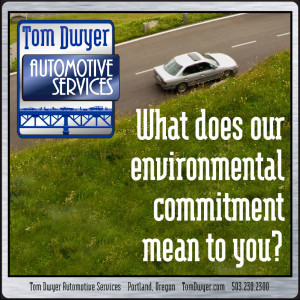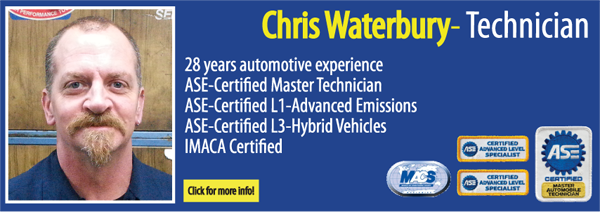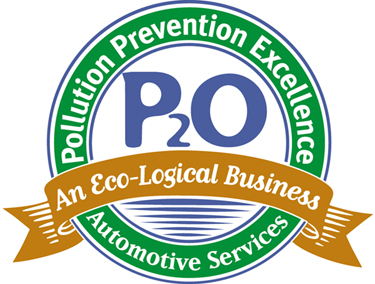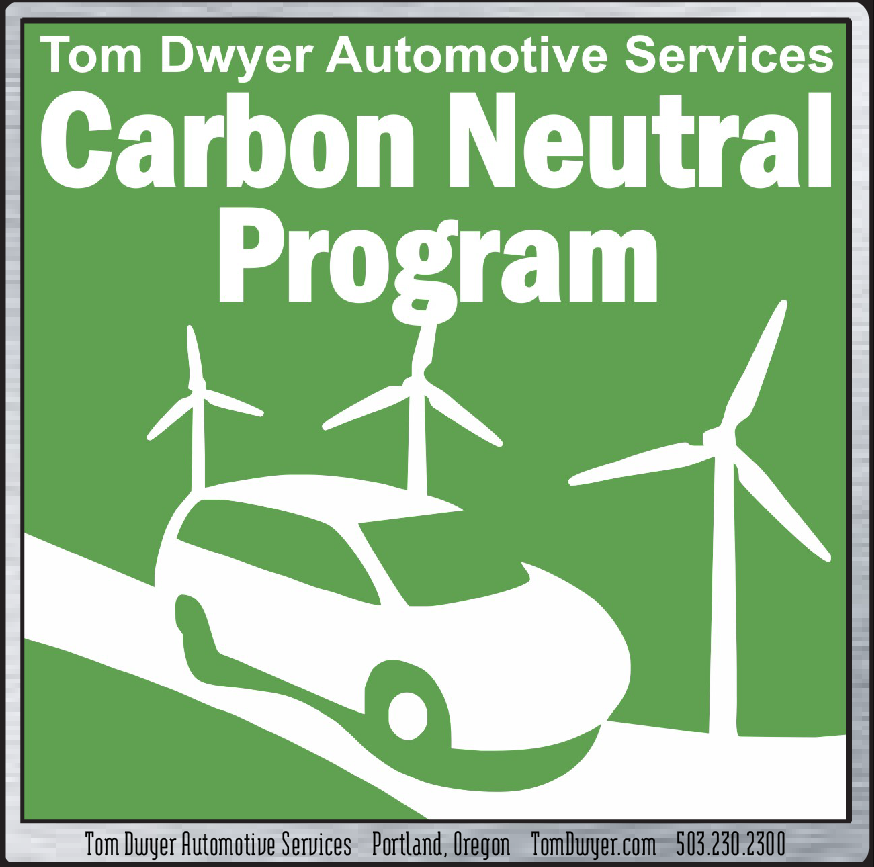
 It affects every part of our business!
It affects every part of our business!
What’s the biggest contributor to atmospheric carbon dioxide? It’s not belching smokestacks or farting cows, it’s your car. Well, probably not your car individually, but in 2010 NASA announced that road transportation had surpassed power generation as the largest source of carbon dioxide. As a company, Tom Dwyer Automotive has loudly proclaimed the need for environmental awareness and action on multiple issues, yet we do it all from our apparently hypocritical seat in the most carbon-intensive industry on the planet. What good is it to have an “environmental commitment” if our very business model encourages pollution? What difference does it make to you or your vehicle if we care about the environment or not? Quite a bit, actually…
It’s not just us. If you drive an automobile, Climate Change has your fingerprints all over it too. People are finally coming to terms with the fact that our western industrialized lifestyle is killing the planet. Each of us, individually, plays some role in pollution, environmental degradation, and Climate Change. But environmental impact isn’t graded on a pass/fail basis, it’s a continuum. Few of us have the desire or ability to live completely off-grid (and even those would still have some minimal environmental impact) but the alternative is not pollute-all-we-can-and-let-God-clean-it-up. As humans we can’t escape our effect on the environment, but we can minimize it. We can never be perfect, but we can always be better.
That’s the motivation behind our environmental commitment at Tom Dwyer Automotive. We know it’s our job to keep those fossil-fuel fountains on the road, but we have choices about how we do it. We know that everyone drinks the same water and breathes the same air, so when those choices come up we always make them with the environment as the prime consideration. But as companies have noticed consumers desire to be environmentally sensitive as well as the marketing attractiveness of environmentalism, they’ve all tried to make themselves look as environmentally conscious as possible. But our commitment is more than just ‘greenwashing’ and we thought we tell you exactly why…
A well-maintained vehicle is better for the environment
A well-maintained vehicle uses less fuel and runs much cleaner than one that’s been neglected. Just by keeping your vehicle in top shape you (and we) are helping the environment somewhat, but the big environmental jump will be moving away from gas-powered vehicles to electrics. Electric vehicles are here today, but they may not be ready for prime time. They’re still a little expensive for the average pocketbook, range is a little low, and charging stations aren’t as common as they need to be. We’re big advocates of electrics and hybrids, but if you aren’t ready to make the jump then maintaining your vehicle is the best step you can take for now.
We’re training for the Electric Future
We’re not just waiting for the electric future, we’re getting ready for it. Our team of Technicians are all either Certified or Master-Certified by the National Institute for Automotive Service Excellence (ASE), the main group responsible for certifying Technicians as trained and ready. ASE certifies competence in areas like Engine Repair, Drive Train & Axles, Brakes, and others. With the rise of electric vehicles, in 2014 ASE started certifying Technicians in Light-Duty Hybrid/Electric Vehicles, and Chris Waterbury, an ASE-Master-Certified Technician who’s been with us since 1999,  was one of the first of Technicians to achieve this certification.
was one of the first of Technicians to achieve this certification.
More Techs will become Hybrid/Electric certified in the years to come, but for now it’s still a rarity. Of the approximately 300,000 ASE-certified technicians, only 1,457 earned this credential (as of 2016). Put another way, Toyota has about 70% of the hybrid/electric vehicle market and about 1500 dealerships in the US and Canada. That means there’s not yet one ASE-certified hybrid/electric Technician for every Toyota dealership, much less the other dealers and independent shops around the country. We’re very proud of Chris, and very proud to say we have at least 3 more Tom Dwyer Technicians studying to take their Hybrid/Electric tests soon.
For now, we think gas (or hybrid) vehicles are still the way to go, but the sooner we can all switch to electric vehicles the better. When you’re ready to make the switch we’ll be ready and qualified to service yours.
We’re a certified EcoBiz
 EcoBiz (short for eco-logical business) is a program that certifies Auto Repair & Body Shops, Landscapers, and Car Washes in Oregon that meet high standards in reducing toxics, preventing pollution, and protecting the environment. Each applicant is visited and evaluated by EcoBiz program staff, and certified by the Oregon DEQ and a local water authority. (Public agencies, such as fleet maintenance facilities and parks departments, are also eligible for EcoBiz Certification). Tom Dwyer Automotive Services was one of the first auto businesses certified by the Pollution Prevention Outreach in the Portland Area. EcoBiz is fanatical about recycling, so when they came for our certification visit they were blown away to find we already recycled everything from used motor oil and dirty fluids to the mercury in automotive switches. Certification covers all aspects of the business, including
EcoBiz (short for eco-logical business) is a program that certifies Auto Repair & Body Shops, Landscapers, and Car Washes in Oregon that meet high standards in reducing toxics, preventing pollution, and protecting the environment. Each applicant is visited and evaluated by EcoBiz program staff, and certified by the Oregon DEQ and a local water authority. (Public agencies, such as fleet maintenance facilities and parks departments, are also eligible for EcoBiz Certification). Tom Dwyer Automotive Services was one of the first auto businesses certified by the Pollution Prevention Outreach in the Portland Area. EcoBiz is fanatical about recycling, so when they came for our certification visit they were blown away to find we already recycled everything from used motor oil and dirty fluids to the mercury in automotive switches. Certification covers all aspects of the business, including
Hazardous waste management Air quality and pollution
Spill prevention and response Product and waste storage
Purchasing and inventory management Cleaning procedures
Recycling practices Energy and water use
Vehicle washing and stormwater Employee training
If you really want to dig deeply into the EcoBiz requirements, you can download the Auto Checklist or Auto Guide here, and if there’s some reason to find an EcoBiz auto shop other than Tom Dwyer you can get a map of them all here.
We offset the carbon production of our shop
No matter how tightly we stick to the EcoBiz guidelines we’re still producing carbon, and that’s not acceptable. We can’t stop, but we can make up for it through carbon offsets.
“Offsets” are based on the idea that the amount of carbon (or other greenhouse gasses) an  individual or business produces can be offset by funding carbon reduction in other places. One carbon offset is the reduction of one metric ton (1000kg) of carbon, or its equivalent in other greenhouse gasses (CO2e). For example, if a power plant can install equipment to reduce 100 tons of carbon then it could create 100 carbon offsets, which it can sell to fund the equipment. Conservation projects also create offsets; for example tree planting can absorb anywhere from 2 to 48 metric tons of carbon (2000kg to 48000kg) of carbon per tree per year, or 2 to 48 carbon offsets.
individual or business produces can be offset by funding carbon reduction in other places. One carbon offset is the reduction of one metric ton (1000kg) of carbon, or its equivalent in other greenhouse gasses (CO2e). For example, if a power plant can install equipment to reduce 100 tons of carbon then it could create 100 carbon offsets, which it can sell to fund the equipment. Conservation projects also create offsets; for example tree planting can absorb anywhere from 2 to 48 metric tons of carbon (2000kg to 48000kg) of carbon per tree per year, or 2 to 48 carbon offsets.
We fully offset the carbon production of our shop, right down to the amount we generate by test-driving clients’ vehicles. We buy or carbon offsets from Bonneville Environmental Foundation, an Oregon company that’s been working on watershed restoration and renewable energy since 1998. Their offsets qualify for the Green-e Certification to ensure the money they generate is going to the most effective mitigation projects.
We work with outside environmental groups
Like many companies, we spend money and time on outreach and marketing. Because we care about the environment, we choose to spend those dollars and hours with organizations that promote environmental awareness and action like 350.org, Sierra Club, and Willamette Riverkeeper.
We offer a one-of-a-kind Carbon Neutral Program
 But perhaps our proudest achievement is our Tom Dwyer Automotive Carbon Neutral Program (CNP), a partnership with Bonneville Environmental Foundation (BEF). We started the CNP in 2007 to allow our clients to offset the carbon output of their vehicles and save money at the same time. As of 2019, the members of the Tom Dwyer Automotive Carbon Neutral Program (CNP) have been responsible for removing over 2 MILLION POUNDS OF CARBON from our air!
But perhaps our proudest achievement is our Tom Dwyer Automotive Carbon Neutral Program (CNP), a partnership with Bonneville Environmental Foundation (BEF). We started the CNP in 2007 to allow our clients to offset the carbon output of their vehicles and save money at the same time. As of 2019, the members of the Tom Dwyer Automotive Carbon Neutral Program (CNP) have been responsible for removing over 2 MILLION POUNDS OF CARBON from our air!
If you’re environmentally-minded as well then we definitely want you to join the CNP. Your 1-year membership will not only offset the carbon production of your vehicle, but you’ll also save 10% on labor charges here at the shop and you’ll get a really cool window cling sticker.
Cost varies by vehicle type and the number of offsets you need. Sippers (hybrids and electrics) cost about $30, drinkers (most cars) cost about $50, and guzzlers (big gas users) cost about $90. And because we’re environmentally committed, because we want you to offset your carbon production, we make no money off the sale of these offsets. The price you’ll pay is the price we pay to BEF!
You can breathe easy with Tom Dwyer
It seems like every company these days is thinking about the environment, but that’s because they see that every person is thinking about it as well. If the environmental stance of the companies you deal with matters to you, then you can rest easy dealing with Tom Dwyer Automotive. Our environmental commitment is much more than greenwashing… it drives everything we do!
Digging Deeper…
Which industries and activities emit the most carbon? The Guardian, Apr 2011
Vehicles are now America’s biggest CO2 source but EPA is tearing up regulations, Oliver Milman in The Guardian, Jan 2018
Germany Has Proven the Modern Automobile Must Die, Emily Atkin in Wired, Aug 2018
Car Emissions & Global Warming, Dave Cook on Union of Concerned Scientists,
Shrinking Your Footprint- What are those carbon offsets you keep hearing about? Charles Letherwood on Tom Dwyer Automotive, Sep 2011
What Does It Mean To Step Lightly? Understanding your carbon footprint, Charles Letherwood on Tom Dwyer Automotive, Feb 2011
We’re now CERTIFIED for hybrids and electrics! Charles Letherwood on Tom Dwyer Automotive, Aug 2016










